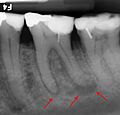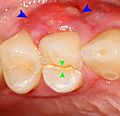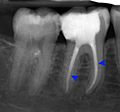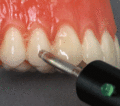Toothache facts for kids
A toothache is a pain you feel in or around a tooth. It usually happens when a tooth is damaged or has a problem. This pain can range from mild soreness to a sharp, throbbing feeling.
Contents
What Causes a Toothache?
Toothaches can be caused by many different things. Most often, they happen because of issues inside your mouth.
Tooth Decay
The most common reason for a toothache is tooth decay. This is when tiny holes, called cavities, form in your teeth.
- Cavities are caused by plaque, a sticky film of bacteria that builds up on your teeth.
- These bacteria make acids that slowly eat away at your tooth's hard outer layer, called enamel.
- If decay goes deep enough, it can reach the sensitive inner part of your tooth, called the pulp, which contains nerves and blood vessels. This causes pain.
Injuries to Teeth
Sometimes, a toothache can come from an injury. This might happen if you:
- Bite down on something very hard.
- Have an accident that chips or cracks a tooth.
- Grind your teeth, especially at night.
Even a small crack can expose the sensitive inside of your tooth to hot or cold things, causing pain.
Gum Problems
Problems with your gums can also lead to tooth pain.
- Gum disease (gingivitis or periodontitis) can make your gums swollen and sore. If it gets worse, it can affect the bone supporting your teeth, making them loose and painful.
- An abscess is a pocket of pus caused by a bacterial infection. It can form at the tip of a tooth's root or in the gums next to a tooth. Abscesses cause severe, throbbing pain and can make your face swell.
Other Reasons for Pain
Sometimes, pain that feels like a toothache might be caused by something else.
- Wisdom teeth can cause pain when they start to grow in, especially if there isn't enough space for them. They might push against other teeth or get stuck.
- Sinus infections can sometimes cause pain in your upper back teeth because the roots of these teeth are close to your sinus cavities.
- Jaw problems or issues with your temporomandibular joint (TMJ), which connects your jaw to your skull, can also cause pain that feels like it's coming from your teeth.
What Are the Symptoms?
The main symptom of a toothache is pain, but it can show up in different ways:
- Sharp, shooting pain when you bite down.
- Throbbing, constant pain.
- Pain that gets worse when you eat hot or cold foods or drinks.
- Swelling around the tooth or in your jaw.
- Fever or headache, especially if there's an infection.
- Bad taste in your mouth if there's an abscess that has burst.
When to See a Dentist
It's important to see a dentist if you have a toothache that:
- Lasts longer than a day or two.
- Is very severe.
- Comes with a fever, earache, or pain when you open your mouth wide.
- Causes swelling in your face or jaw.
Ignoring a toothache can lead to more serious problems, like spreading infections.
How to Prevent Toothaches
The best way to avoid toothaches is to take good care of your teeth:
- Brush your teeth twice a day with fluoride toothpaste.
- Floss daily to remove food and plaque between your teeth.
- Limit sugary foods and drinks, which feed the bacteria that cause decay.
- Visit your dentist regularly for check-ups and cleanings. This helps catch problems early before they become painful.
- Wear a mouthguard if you play sports where your teeth could get hit.
How Dentists Help
When you see a dentist for a toothache, they will examine your mouth and might take X-rays to find the cause.
- For cavities, they will remove the decayed part and fill the tooth.
- For deep decay or infection, a dentist might perform a root canal. This involves removing the infected pulp and sealing the tooth.
- If a tooth is severely damaged or infected and cannot be saved, it might need to be extracted (pulled out).
- For gum problems, the dentist will clean your teeth thoroughly and might recommend special treatments to help your gums heal.
Images for kids
-
A monk with a toothache examines himself in a mirror, painting by Carl Bloch from 1875.
See also
 In Spanish: Dolor de muela para niños
In Spanish: Dolor de muela para niños
 | Emma Amos |
 | Edward Mitchell Bannister |
 | Larry D. Alexander |
 | Ernie Barnes |













